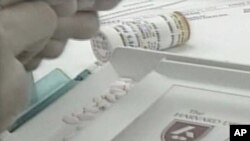Millions of people around the world at risk for disease are taking a statin drug to help lower bad cholesterol, known as LDL [Low Density Lipoprotein]. But statin drugs are not as effective in raising HDL [High Density Lipoprotein], the good cholesterol in the blood that helps fight disease. Now doctors are excited about a new drug that dramatically increases those HDL levels. Patients may still have to wait a few years before the drug is available to the public.
Doctors have high hopes that a new drug called anacetrapib might possibly save lives in the future. At least 1,600 patients took part in a limited trial of the drug, with some taking anacetrapib and others taking a placebo.
Dr. Christopher Cannon of Brigham and Women's Hospital in Boston was the senior investigator in the study. "We studied a new medication that's four to 10 times stronger than any prior therapy," he said.
For years, doctors prescribed statin drugs to lower bad cholesterol. But statins are not as effective in raising good cholesterol that works to remove plaque from arteries.
In the study, patients taking anacetrapib saw their bad cholesterol drop by 40 percent and their good cholesterol by 138 percent.
Dr. Harlan Krumholz is specialist with the Yale University School of Medicine. "It really has a remarkable effect on lowering of the bad cholesterol and raising of the good cholesterol," he said.
Researchers agree a much larger and longer clinical trial is needed. Early next year 30,000 people will begin a four year international study of the drug. Patients already diagnosed with disease, and who are on statin drugs, will be taking anacetrapib.
Dr Krumholz says the medical community needs to learn much more before the drug goes on the market. "It's still to be told whether or not these changes can translate into a meaningful benefit for patients," he said.
In the meantime, doctors say the old advice still stands: exercise regularly, eliminate fattening and unhealthy foods that might run up the bad cholesterol.




